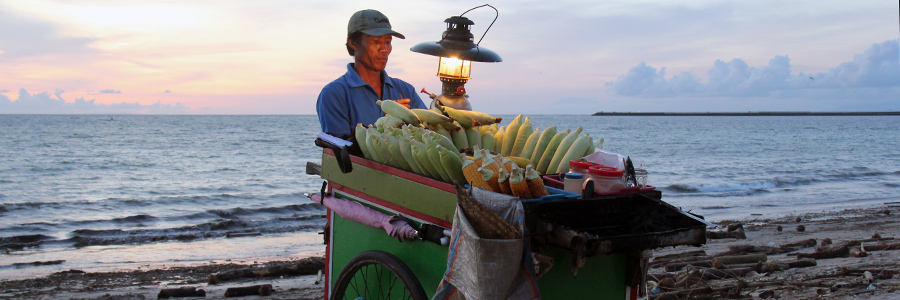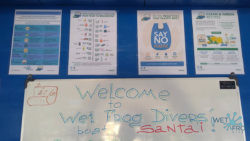
What is allowed and what should be avoided?
When in Rome do as the Romans do
We all have heard this saying and we all appreciate when guests who come to our countries respect our attitudes, traditions and culture. So why not do the same when we travel to other countries?
Especially in Asia, there are many exotic destinations famous for their unique cultures, habits and specific ways of social behaviour. Indonesia is one of these beautiful countries where specific ways of behaviour are observed.
 Indonesia is a very big country, and sometimes you will realise that some of the “rules” differ from one island to another. Yet in general, there are some basic things that you should consider and keep in mind when travelling to Indonesia – nor matter whether it is in Bali or in Komodo.
Indonesia is a very big country, and sometimes you will realise that some of the “rules” differ from one island to another. Yet in general, there are some basic things that you should consider and keep in mind when travelling to Indonesia – nor matter whether it is in Bali or in Komodo.
Having been living in Asia for a while and knowing a bit of the Indonesian culture, we understand that nobody would feel comfortable doing some “awkward” things, especially if it is a totally normal thing in your home country.
So, we set up a small list of things that you can keep in mind when travelling and that might help you to feel comfortable and relaxed during your holiday on Flores and when diving in Komodo.
Do’s
- Always smile! This is probably the most important difference between Europe and Asia. Indonesian people smile when they greet, when they answer “YES” or “NO”, when they agree or disagree with you, when they are shy or just as a welcome sing to a foreigner.
- Bend down! When you are passing an elder person or a person who is sitting, you should bend down a bit to show respect.
- Address local people with the following titles:
Bapak – for men. Especially if they are elder than you.
Ibu – for women. Especially if they are elder than you.
Mas – for boys.
Mbak – for girls.
- Wear long sleeve t-shirts and trousers (or special local sarongs, kind of long skirts) when visiting holy places, like temple, churches or mosque. Or if you will be invited to visit an Indonesian family in their house, or to attend a ceremony.
- Take off shoes! In many shops, restaurants and houses you will be asked to take off your shoes before entering the place. It is a sign of appreciation. Therefore, flip-flops are the best footwear here.
- Bargain! You can always negotiate and bargain for a better price. Always do it with a smile and politely; and only if you really intend to buy the product. Yet if it says “Harga Pas!”, it means it is a fixed price and no bargaining is wished.
Don’ts
- Don’t touch the head! Asian people believe that the head is where the spirit lives and is considered sacred. Thus do not touch a person’s head. Even if it is normal in your country to cuddle a cute child on its head, never do it in Indonesia.
- Don’t shout in public! It is understood as highly offensive behaviour if someone shouts, or expresses anger, looks rude or slams doors in public (or even in the own home). People who do this in public are seen as rude individuals. Indonesians keep the culture of living in harmony. So dealing with anger and difficulties happens behind closed doors.
- Don’t dress too naked! Indonesia is a Muslim country. And although some islands are more Christian or Hindu (Bali), and some places became touristic attracting many foreigners, the understanding of modest and appropriate dressing is much appreciated. Dressed exposing too much skin is considered as highly offensive and disrespectful to their faith. On some public beaches it is better to swim in t-shirt and shorts – especially for female guests.
- Don’t use your left hand for eating or passing! The left hand is considered unclean as it is used for “toilet duties”. Therefore, do not touch food, pass or receive anything, touch anyone or point with your left hand. If your right hand is busy, switch the item to your left hand.
- Don’t disturb a prayer! Religion is important to the people in Indonesia and it is the most sensitive topic. Never argue about the religion and do not complaint or disturb while people are praying or holding a ceremony. Respect and honor the ceremony/praying time, make sure you are not sitting higher than the holy person and do not take photos with a flash, unless asked for permission before.
- Don’t point your feet at another person! Don’t allow the bottom of your feet to face or point at another person. It is considered rude and insulting to a person. In general, it is advised to keep both feet on the floor when sitting. Do not cross your legs, especially not with an ankle over the knee.
Diving rules in Komodo National Park
 Diving in Komodo means diving in a protected area. Since March 1980, Komodo has been declared as National Park and the official protection began. The Park has been created to protect the unique Komodo Dragons, and includes also one of the richest marine environments including coral reefs, mangroves, seagrass beds, seamounts, and semi-enclosed bays. More than 1,000 species of fish, some 260 species of reef-building coral, 10 types of dolphins, 6 types of whales, green turtles and various types of sharks and stingrays inhabit Komodo National Park.
Diving in Komodo means diving in a protected area. Since March 1980, Komodo has been declared as National Park and the official protection began. The Park has been created to protect the unique Komodo Dragons, and includes also one of the richest marine environments including coral reefs, mangroves, seagrass beds, seamounts, and semi-enclosed bays. More than 1,000 species of fish, some 260 species of reef-building coral, 10 types of dolphins, 6 types of whales, green turtles and various types of sharks and stingrays inhabit Komodo National Park.
Therefore it is important to know and to follow some “rules” when diving or snorkelling in Komodo National Park.
The following are guidelines for environmentally friendly diving and snorkelling activities. We brief our guests on each tour, and appreciate if you read them here as well.
- No Touching – Do not touch or step on anything. By touching corals or animals you cause stress to animals and transmit diseases.
- Take Photos Naturally – Do not put anything (animals or corals) to a better place or put your camera on reefs in order to get the “perfect” photo. It will disturb marine life.
- No Gloves or Knives – Do not use gloves or knives under water. Knives can only be used by trained staff and in emergency or rescue situation.
- No Feeding – Do not feed any fish. It creates unnatural interacting, increases nutrients, and leads to imbalance within the ecosystem.
- Good Buoyancy – Please keep distance to corals, sand, reefs and animals. If practiced bad buoyancy, it could damage marine life.
- No Collecting – Do not take anything from the ocean or the islands, neither dead nor alive.
- Secure Equipment – Please make sure that your equipment is not dragging over reefs, corals, or sand.
- No Littering – Do not throw anything into the ocean, or leave it on the islands. Please use the bins provided.
Thank you for reading and understanding. We are here for you if you have more questions.




